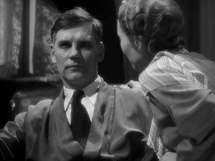 |
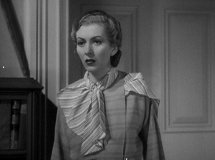 |
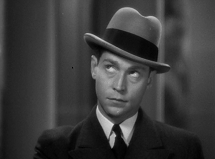 |
| President Jud Hammond … Walter Huston |
Pendy Moloy … Karen Morley |
Beek … Franchot Tone |
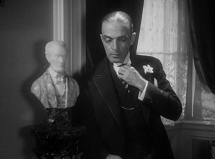 |
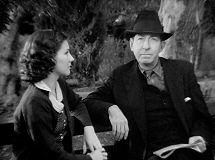 |
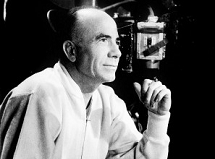 |
| Nick Diamond … C. Henry Gordon |
Bronson … David Landau |
Directed by Gregory La Cava |
Proof That It’s Pre-Code
- A movie about the President of the United States. The man elected is a complete coward, a screw up who’s only function is to act as a mouthpiece for his political party. He jokes about corruption and joyously lies to the American people, and the entire system he oversees is rotten to the core.
- He’s also secretly diddling his personal secretary, though he’s not married, which is a rarity for a President.
- The film concerns “the collapse of the American democracy”. Which the people who made this film consider as a good thing.
- We always talk about pre-Code’s tenuous relationship with the 18th amendment and Prohibition– and this movie has a subplot where that’s repealed. You see, even God wants you to have booze.
The Fascist Fantasy
“Gentlemen, I suggest you read the Constitution of the United States. You’ll find that the president has some power.”
When I was in eighth grade, my friends and I would play a game at lunch. It was called ‘Thermonuclear War’, and each of us got a compass and map of the world and we’d piece by piece knock out nations and continents with tactical nuclear strikes. The game got more involved as it went along, and it soon began to involve politics, negotiations, and more ruthless military actions.
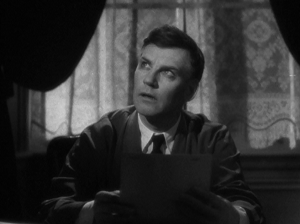
Huston’s transformation to possession is almost borderline creepy.
The game gave you the opportunity to live out your maddest nationalist fantasies. I bring this up because Gabriel Over the White House, one of the oddest movies of pre-Code, is pretty much the exact same thing in film form. A man comes to power, overrides law and disorder, solves all of the world’s problems and transforms the world into a utopia by his own sheer will.
It’s not surprising when this kind of adolescent power fantasy appears in the movies every so often, and probably less surprising that it pops up at one of our nation’s lowest points. What is surprising how nakedly goofy it turns out to be; the makers of Gabriel held absolutely nothing back.
You see, the story follows Jud Hammond, the newly elected President. The United States is in the midst of a great depression of some sort, but Hammond couldn’t care less: he’s there to tow the party line. He opens up the country’s ranks to supporters and monkeys around with his nephew as a labor leader named John Bronson takes to the radio to make demands of the government about unpaid war bonuses and the like.
Hammond’s private secretary, Beeks (Tone) is a little underwhelmed by this. He’s the idealist of the picture, and becomes further unnerved when a secretary named Pendy shows up to function as the President’s right hand woman. Winks from everyone all around.
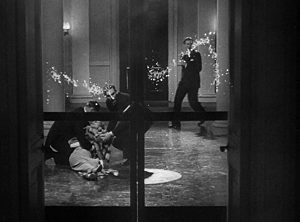
Ladies and gentlemen, the only movie you may ever see that involves a drive-by shooting at the White House.
So the country is in the grips of a depression, and every ‘yes’ man who surrounds Hammond with the exception of Beeks declares unemployment and racketeers to be a local problem. John Bronson is labeled an ‘anarchist’ despite the crowds of despondent men he draws. The White House Press Corp, who have to submit their questions in writing beforehand, settle in and prepare for a relaxing, quiet four year stint. Hell, Hammond is so goofy and ineffectual, he uses his desk in the Oval Office to store marshmallows.
But this wouldn’t be much of a movie if it was just about a bad president. Hammond, a wholly reckless man in politics, may have a nut loose in more than one way: he takes the wheel of the Presidential limo and cranks the speed up to 98 MPH. He plows into a tree and falls into a coma.
When he wakes up is when the fun begins. Hammond’s changed, and Huston has gone from a dope to a man with a pensive stare and furled brow. He agrees to meet with Bronsan’s army of unemployed men, and offers up an army of conscription, using the government to create jobs for them.
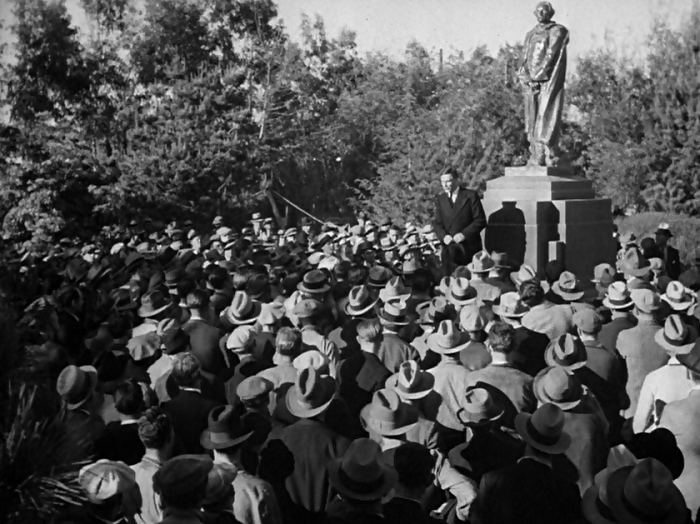
Nice visual equivalency there with Hammond and the statue of Washington.
This pisses off Congress, so Hammond helpfully tells them to shove it and declares Martial Law. It must be said that this goes over remarkably well.
To follow this up, he invites a gangster, Nick Diamond, to the White House, and reads him the riot act. He repeals the 18th Amendment, incurring the wrath of the mobsters, and we get a singular treat as the mobsters do a drive-by shooting of the White House, taking out Pendy in the process.
By this point, Pendy and Beek have Hammond’s number. They believe that he’s been taken over by the archangel Gabriel. Yes, the archangel Gabriel.
“Gabriel? I thought he was the messenger of wrath.”
“Not always. To some he was the messenger of revelations.”
Pendy survives the shooting and her reawakening confirms that she and Beeks are meant to be together. Hammond sanctions this union, but first he has another task for Beeks: hunt down and kill bootleggers. All of the bootleggers.
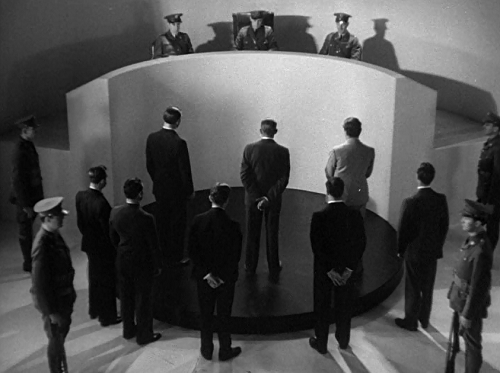
Cool looking court. It’s impressive how fascist it looks, which certainly matches the film’s tone.
Beeks does this with tanks and he tries the survivors in one of the coolest looking art deco courtrooms you’ll ever see. He has the gangsters executed in the shadow of the Statue of Liberty; the country is free from their tyranny.
If that seems like an impressive accomplishment, hold on, Gabriel/Hammond hasn’t quite wrapped up yet. Distressing that the Europeans won’t pay back their debts from the first World War, he decides to invite the leaders of the world over and have them watch as he uses American bombers to blow up two of his own boats.
He uses this demonstration to cow them into dismantling their armies and signing a worldwide peace treaty in a classic move from the ‘I’m so insane, I’ll blow my own shit up’ playbook. It works extremely well, and Hammond signs the treaty with Lincoln’s pen and then, quickly and solemnly, passes on.
He’s saved America single handedly… and the world.
The Darkest of Times
“Does the President of the United States meet with your approval?”
“He’s proved himself to be one of the greatest presidents to have ever lived.”
Gabriel Over the White House is a film that reeks of the early 1930’s. Every social concern– unemployment, bootleggers, international debts, and the fear of another World War– are addressed in definitive, simplistic ways.
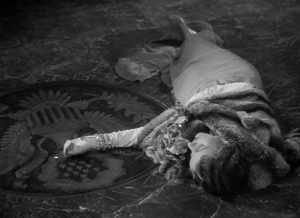
Blood on the Presidential carpet.
That’s not to say Gabriel is a simple film. It evokes God and his lead archangel as a divine excuse to rationalize why ending American democracy is a just decision. The figures of Lincoln and Washington are liberally used in tandem with Hammond’s image, again granting his sudden swing towards fascist legitimacy.
The backers of the film– most notably William Randolph Hearst— saw this as a political fable that could serve as a blueprint for Presidential hopeful Franklin Roosevelt. Roosevelt apparently even saw and approved of it, feeling that the ‘desperate times call for desperate measures’ thing applied.
The movie portrays the government– the newly minted militarized dictatorship of a government– to be infallible. Government run liquor stores and employment initiatives are given glowing recommendations; this film is two steps away from being persecuted as a Communist.
When this came out Hitler was still working his way up, while Mussolini and Stalin were already at the helm of their countries. But no one could really comprehend where everyone was headed. Fascism was still an attractive option: ironic that to save America, some people believed that destroying its government was the only possible solution.
Gabriel is such an overt power trip and so legitimately baffling that it’s endlessly entertaining. It’s a time capsule of a different political era with different, simpler ideas. Thanks to a game cast and good direction, it’s watchable, even if it remains hilariously incomprehensible.
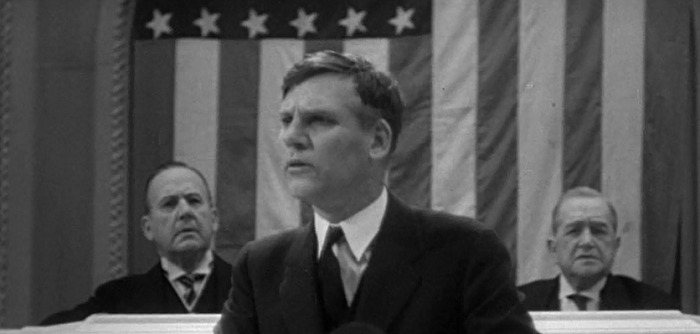
Trivia & Links
- TCM’s Movie Morlocks goes heavily into the back story for this one. To sum it up: Newspaper magnate William Randolph Hearst (yes, the man whose life formed the basis of Citizen Kane) pushed through this film with the ideas of what he believed Franklin Roosevelt could embody as President. FDR even offered input into the film, and some of the seeds you see here, like the army of veterans, came to fruition in reality. The head of MGM, Louie B. Mayer, was a staunch Republican and Hoover supporter, and their clashes led to the movie’s release after the election.
- Dave Sindelar over at Fantastic Movies and Musings talks about the film’s removal from circulation. It turns out Jud Hammond as a dictator might have reminded other people of a certain OTHER mad dictator who went mad with power. And was German. And had a tiny mustache.
- Goatdog’s Movies launches into a political analysis of what he thinks the film is actually trying to say, and ends up chasing his own tail. He also recommends the movie in spite its strangeness:
Of all the crackpot political films to come out of Hollywood […], this is surely the crackpottest, and must really be seen to be believed.
- This movie is available to buy at Amazon and Warner Archive and to rent at Classicflix. If it’s still there, you may also be able to catch it at YouTube.


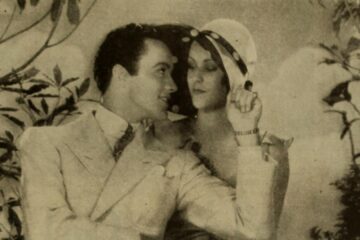


1 Comment
srogouski · December 22, 2016 at 5:30 pm
I don’t think this is *just* a fascist movie and I don’t think it’s necessarily a bad movie.
I do think it falls apart in the second half but the section on the Army of the Unemployed (The Bonus Army) is solid. A few months before Gabriel Over the White House was filmed, Hebert Hoover sent Douglass MacArthur army to bust up the Bonus Army camp near the Washington Mall. That was a fascist act, to use tanks and regular army troops against homeless men, a horrific act Gabriel Over the White House protests.
The summary execution of Nick Diamond, of course, is horrifying (Franchot Tone comes off like a repellent, smirking little preppy). The demonstration of American air power is well-done but dramatically implausible. In 1933, the Japanese and British were both far ahead of the United States as far as using aircraft carriers went.
It’s too bad Gregory La Cava didn’t focus exclusively on the Army of the Unemployed. He might have made a great film.
Comments are closed.